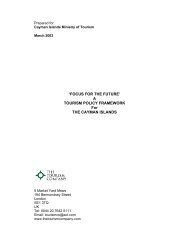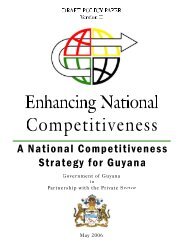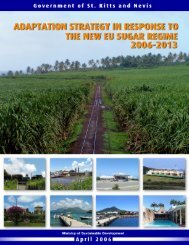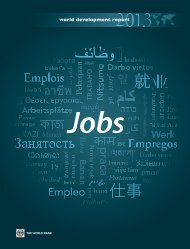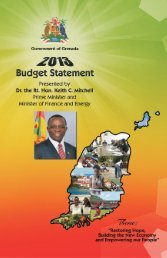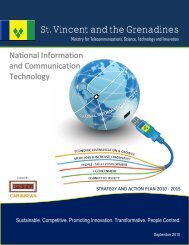Creating
Doing Business in 2006 -- Creating Jobs - Caribbean Elections
Doing Business in 2006 -- Creating Jobs - Caribbean Elections
Create successful ePaper yourself
Turn your PDF publications into a flip-book with our unique Google optimized e-Paper software.
ENFORCING CONTRACTS 63<br />
What to reform?<br />
Courts should be fast, fair and affordable. Long delays,<br />
as experienced in Italy and Guatemala (table 10.3), force<br />
businesses to look for other means of resolving disputes.<br />
If going to court is expensive, as in Timor-Leste and the<br />
Democratic Republic of Congo, fewer business transactions<br />
occur—and those that do involve only a small<br />
group of people linked by kinship, ethnicity or previous<br />
dealings. Less wealth is created.<br />
Three reforms are most urgent:<br />
• Reduce delays in deciding cases.<br />
• Cut the number of appeals to the supreme court.<br />
• Make enforcement competitive.<br />
Reduce delays in deciding cases<br />
TABLE 10.3<br />
Where is enforcing contracts the most efficient—and<br />
where the least?<br />
Procedures (number)<br />
Fewest<br />
Most<br />
Australia 11 Kuwait 52<br />
Greece 14 Lao PDR 53<br />
Iceland 14 United Arab Emirates 53<br />
Norway 14 Egypt 55<br />
Tunisia 14 Cameroon 58<br />
United Kingdom 14 Sierra Leone 58<br />
Denmark 15 Iraq 65<br />
Uganda 15 São Tomé and Príncipe 67<br />
Hong Kong, China 16 Sudan 67<br />
Ireland 16 Timor-Leste 69<br />
Time (days)<br />
Least<br />
Most<br />
Tunisia 27 Lebanon 721<br />
Netherlands 48 Nigeria 730<br />
New Zealand 50 Congo, Dem. Rep. 909<br />
Japan 60 Slovenia 913<br />
Singapore 69 Sudan 915<br />
France 75 Poland 980<br />
Korea 75 Timor-Leste 990<br />
Denmark 83 Angola 1,011<br />
Norway 87 Italy 1,390<br />
Belgium 112 Guatemala 1,459<br />
Cost (% of overdue debt)<br />
Least<br />
Most<br />
Norway 4.2 São Tomé and Príncipe 69.5<br />
New Zealand 4.8 Central African Republic 72.2<br />
Switzerland 5.2 Burkina Faso 95.4<br />
Denmark 5.3 Papua New Guinea 110.3<br />
Korea 5.4 Bhutan 113.8<br />
Sweden 5.9 Cambodia 121.3<br />
Belgium 6.2 Indonesia 126.5<br />
Finland 6.5 Malawi 136.5<br />
United States 7.5 Timor-Leste 183.1<br />
Taiwan, China 7.7 Congo, Dem. Rep. 256.8<br />
Source: Doing Business database.<br />
Four types of reform reduce the time it takes to enforce<br />
a contract. One is introducing summary proceedings<br />
or simplified trial procedures. Another is simplifying<br />
procedures for collecting and hearing evidence. A third<br />
is changing case management practices. The final one is<br />
using lower courts to decide simple commercial cases.<br />
In a summary proceeding the creditor need only<br />
present the judge with evidence of the transaction and<br />
nonpayment. Debt cases no longer go through preliminary<br />
investigation before court clerks. In Burundi<br />
this reform cut nearly 3 months off the time to recover<br />
debt. In Latvia the creditor can enforce payment immediately<br />
after the hearing. Not all reforms bring the<br />
desired results. For example, in Poland a simplified trial<br />
procedure exists for small claims up to $3,000. But few<br />
people use it. Restricted access—with claims arising<br />
from unpaid utility bills ineligible—and court fees that<br />
equal those for the regular procedure explain the lack of<br />
enthusiasm.<br />
In 94 countries only written evidence is admitted<br />
for a judge’s consideration. When judges hear cases, they<br />
read and approve the record of any new evidence. This<br />
takes days, sometimes weeks, to transcribe. In 2004 Brazil<br />
allowed oral evidence in its courts. In Germany a judge<br />
need no longer hear witnesses or experts if they have already<br />
testified on the same matter before another judge.<br />
This is possible even without the consent of the parties<br />
to the case. And if judges decide they have enough evidence,<br />
they can interrupt hearings and issue judgments.<br />
In Finland hearings are now optional. Judges can decide<br />
on cases based solely on the evidence submitted.<br />
Case management is illustrated by Slovenia’s reforms,<br />
which involved 2 changes. First, judges are responsible<br />
for following cases from start to finish rather<br />
than sending the parties from one court administrator<br />
to another. Second, a preliminary hearing clarifies the<br />
nature of the dispute so that parties come to the main<br />
hearing prepared. In its first year case management has<br />
cut Slovenia’s average time to resolve disputes by 90 days.<br />
Attorney fees tend to be lower in countries with<br />
case management: the average cost of resolving a dispute<br />
about a debt is 15% of the debt’s value in countries with<br />
case management and 29% in countries without, even<br />
after controlling for income per capita. This is because<br />
cases move faster. Georgia is implementing case man-



